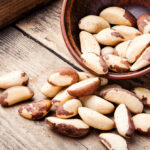Combat cognitive decline and grow new brain cells with an intriguing mineral
 (NaturalHealth365) At its mildest – which may involve occasional “blanking” on names or temporarily misplacing car keys – it causes embarrassment, annoyance, or minor inconvenience. At its worst, it is debilitating, jeopardizing the ability to read, write, and talk and threatening one’s ability to live independently.
(NaturalHealth365) At its mildest – which may involve occasional “blanking” on names or temporarily misplacing car keys – it causes embarrassment, annoyance, or minor inconvenience. At its worst, it is debilitating, jeopardizing the ability to read, write, and talk and threatening one’s ability to live independently.
We are speaking, of course, of cognitive decline. Sometimes called cognitive impairment, this age-related condition is characterized by a decrease in the ability to learn, remember, and concentrate. There is currently no cure for cognitive decline, and ongoing research focuses on therapies and treatments intended to alleviate it or slow its progress. Recent research has illuminated the ability of selenium, an essential trace mineral, to help maintain healthy cognitive function – and potentially combat cognitive impairment.
What functions does selenium perform in the body?
Selenium is an important constituent of selenoproteins, a group of compounds needed for antioxidant defense, DNA synthesis, and thyroid hormone metabolism. (In fact, glutathione, the body’s “master” antioxidant and neutralizer of toxins, is one of the primary selenoproteins). Because selenium combats oxidative damage and inflammation in the brain, it is believed to play an important role in protecting brain health.
And this mineral may even take the protection of cognitive function to the “next level.” In recent studies, it has been found to promote neurogenesis – the formation of new brain cells – in the hippocampus, an area of the brain linked with learning and memory.
Warning: Low levels are linked to neurodegenerative conditions
Like so many health-sustaining compounds, selenium is normally present in good supply in young people but becomes scarcer with age. Researchers have observed that the risk of cognitive decline and Alzheimer’s disease rises as selenium levels fall. In a 2023 meta-analysis published in Nutrients, the authors concluded that people with neurodegenerative diseases have lower levels. These shortfalls can have grave consequences.
For example, preliminary studies have suggested that selenium deficiency causes brain inflammation. Conversely, animal studies have shown that increasing intake can reduce the accumulation of harmful tau and beta-amyloid proteins linked with Alzheimer’s disease.
The “million-dollar question:” Can selenium improve age-related cognitive decline?
Research has yielded encouraging results. Preliminary studies have shown that treating cultured brain cells with selenium led to increases in proliferation and signs of neurogenesis. A separate study showed that adding supplementary selenium directly to the drinking water of elderly mice caused significant improvements in learning and memory. Clearly, cell and animal studies offer valuable data on the potential of this micronutrient. But what about human studies?
In a study published in 2023 in the Journal of Cardiac Failure involving patients with congestive heart failure, participants with higher levels of selenoproteins (which, in turn, indicate selenium levels) performed better on global cognitive tests than those with lower levels. This seemed to echo the findings of an earlier study published in Epidemiology that showed better cognitive performance among older adults with increased levels of selenium.
Another study published in the European Journal of Nutrition showed that supplementing with a single selenium-packed Brazil nut improved verbal fluency and mental function in patients with mild cognitive impairment. However, other research has shown mixed results, and more studies are needed.
It’s worth noting that selenium can also promote heart health and discourage atherosclerosis. A review involving over 433,000 participants with coronary heart disease showed that supplementation decreased levels of inflammatory C-reactive protein while increasing levels of glutathione.
How much is too much?
While serious selenium deficiencies are uncommon in the United States, holistic practitioners note that inadequate intake can occur in vegetarians, vegans, and others who consume little meat and seafood. Consuming food grown in soil with low selenium levels can also cause shortfalls.
The Office of Dietary Supplements recommends 55 micrograms of selenium daily for adults. You can increase your intake by eating oysters, poultry, beef, cold-water fatty fish, and eggs. However, the undisputed “heavyweight” of selenium content is the Brazil nut, with a single ounce (six or seven nuts) delivering a whopping 544 micrograms.
Incidentally, there is such a thing as “too much selenium.” Symptoms of excessive intake include skin rash, nausea, diarrhea, fatigue, and irritability. Acute selenium toxicity, a more serious condition, can lead to tremors, acute respiratory distress syndrome, organ failure, and even death. The Food and Nutrition Board has established a daily upper limit for selenium (from food and supplements combined) of 400 mcg for adults. (Caution – Brazil nuts could cause toxicity if consumed in excessive amounts. A mere half dozen Brazil nuts, in one sitting, could exceed the tolerable upper limit for the day. Limiting yourself to no more than 3 of these tasty, nutritious nuts a day allows you to rack up healthy levels of this essential trace mineral without risk of toxicity.)
Selenium is available as a supplement, with typical amounts ranging from 50 to 400 micrograms a day. However, consult with your holistic doctor before supplementing.
Remember: Other steps to protect cognitive function include proper nutrition, staying physically and mentally active, and maintaining a healthy social network.
The latest research suggests that selenium may help you retain sharp mental function while safeguarding your priceless memories well into old age. It’s certainly wise to ensure you have adequate amounts of this valuable micronutrient.
Sources for this article include:
NIH.gov
LifeExtension.com
NIH.gov
OfficeofDietarySupplements.gov
NIH.gov
NIH.gov
Springer.com
VeryWellHealth.com



